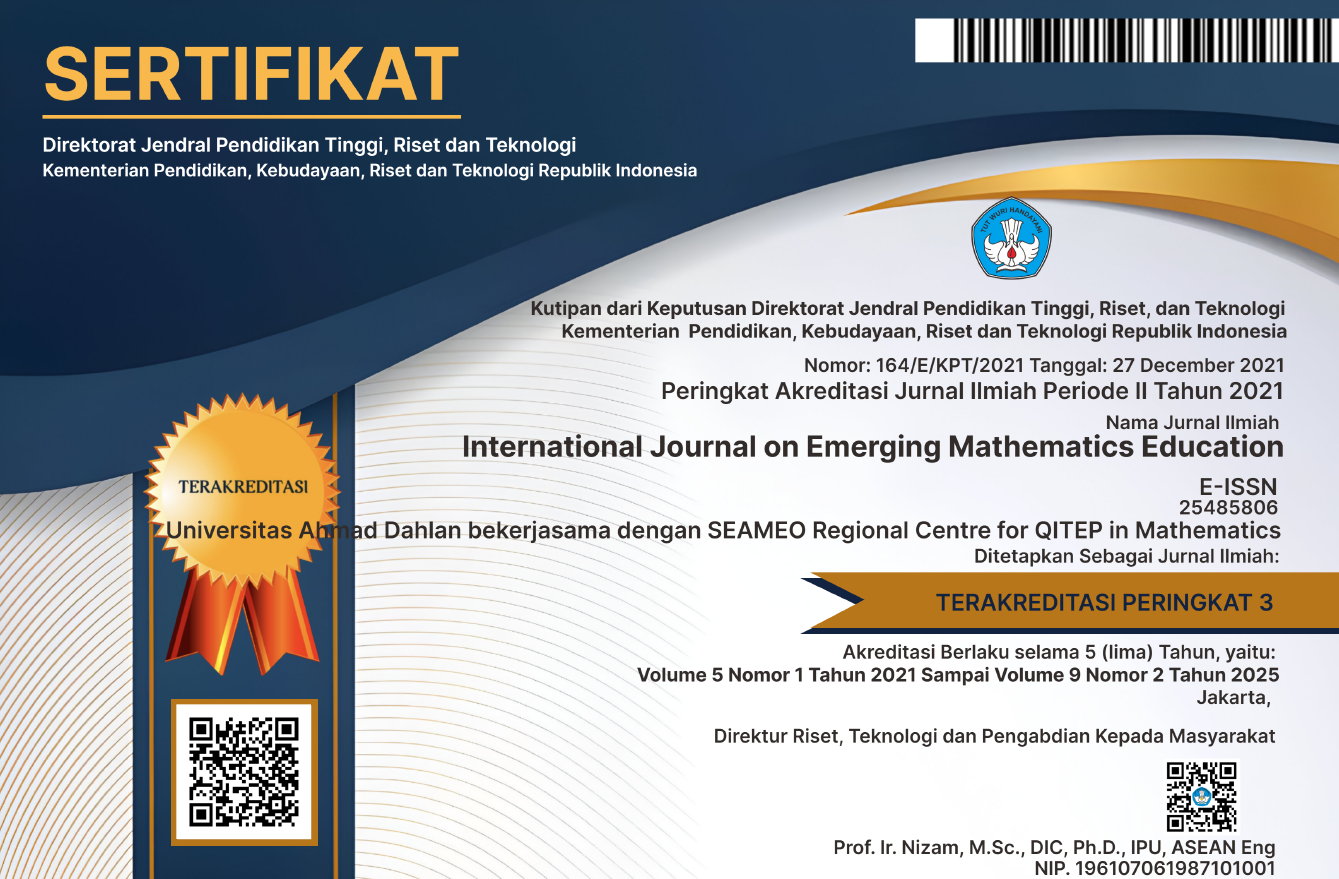The Gap between Theory and Action through a Model for Classroom Inquiry
DOI:
https://doi.org/10.12928/ijeme.v1i2.6698Keywords:
Action Research, Lesson Study, Theory, Action, Classroom InquiryAbstract
This paper reports an investigation about lower secondary teacher professional development program in Iran that seventy teachers of mathematics participate on that. In this program, lesson study and action research are used to create a model for classroom inquiry. The first and important purpose of this model was to filling the gap between theory and action. Results of this study show that it is possible to combine lesson study and action research. Finding of this study also show that using the model for classroom inquiry can be helpful in decreasing the gap between theory and action. Finally, paper will be finish by introducing some obstacle that occurred within the accomplishment of the teacher professional development program.
References
Chaichi, P., Gooya, Z., Mehrabani, N., & Saki, K. (2006). Assessing the goals of action research program in Iran. Seasonal Journal of Education, 85, 107-133.
Gooya, Z. (2007). Mathematics teachers beliefs about the new reform in high school geometry in Iran. Educational Studies in Mathematics, 68, 331-347.
Keeney, M.A., Paganelli, S., Smith, J., Quinn, K., Krane, A., Craven, K. (2002). Lesson study with action research: is the 4-column writing method 4 real? Paper presented at the Annual Meeting of the Mid-Western Educational Research Association (Columbus, OH, October 16-19, 2002).
Kemmis, S., & McTaggart, R. (1988). The Action Research Planner (3rd ed.). Geelong, Australia: Deakin University Press.
Kiamanesh. A., & Faghihi, F. (1997). Islamic Republic of Iran -Educational System-. In D. F. Robitaille (Ed.), National Contexts for mathematics and Science Education: An Encyclopedia of the Education Systems Participating in TIMSS (pp: 189-196). Vancouver, Ca: Pacific Educational Press.
McNiff, J., Lomax, P., & Whitehead, J. (2003). You and Your Action Research Project (2nd ed.). London: Routledge Falmer.
Sanders, P. (2009). Lesson Study: An Effective School-Based Teacher Professional Learning Model for Teachers of Mathematics. In R. Hunter, B. Bicknell, & T. Burgess (Eds.), Crossing divides: Proceedings of the 32nd annual conference of the Mathematics Education Research Group of Australasia (Vol. 2). Palmerston North, NZ: MERGA.
Stigler, J.W., & Hiebert, J. (1999). The Teaching Gap: Best Ideas from the World's Teachers for Improving Education in the Classroom. New York: Free Press.
Strauss, A.L. & Corbin, J.M. (1998). Basics of qualitative research: Techniques and procedures for developing grounded theory (2nd edition). Newbury Park, CA: Sage.
Taylor, A.R., Anderson, S., Meyer, K., Wagner, M.K., & West, C. (2005). Lesson study: A professional development model for mathematics reform. The Rural Educator, 26(2), 17-23.
Taylor, A. (2001). From lesson study to action research: Possibilities and perils. Paper presented to 25th Annual International Conference of the Collaborative Action Research Network, England. 4 November, 2001.
Yoshida, M. (1999). Lesson Study: A Case Study of a Japanese Approach to Improving Instruction through School-Based Teacher Development. Unpublished Doctoral Dissertation, the University of Chicago, USA.
Yoshida, M. (2008). Exploring ideas for a mathematics teacher educator's contribution to lesson study: towards improving teachers' mathematical content and pedagogical knowledge. In D. Torish and T. Wood (Eds.), the international handbook of mathematics teacher education: tools and processes in mathematics teacher education. Rotterdam: Sense publisher.
Downloads
Published
How to Cite
Issue
Section
License
License and Copyright Agreement
In submitting the manuscript to the journal, the authors certify that:
- They are authorized by their co-authors to enter into these arrangements.
- The work described has not been formally published before, except in the form of an abstract or as part of a published lecture, review, thesis, or overlay journal. Please also carefully read the International Journal on Emerging Mathematics Education (IJEME) Author Guidelines at http://journal.uad.ac.id/index.php/IJEME/about/submissions#authorGuidelines
- That it is not under consideration for publication elsewhere,
- That its publication has been approved by all the author(s) and by the responsible authorities, tacitly or explicitly, of the institutes where the work has been carried out.
- They secure the right to reproduce any material that has already been published or copyrighted elsewhere.
- They agree to the following license and copyright agreement.
Copyright
Authors who publish with the International Journal on Emerging Mathematics Education (IJEME) agree to the following terms:
- Authors retain copyright and grant the journal the right of first publication with the work simultaneously licensed under a Creative Commons Attribution License (CC BY-SA 4.0) that allows others to share the work with an acknowledgment of the work's authorship and initial publication in this journal.
- Authors are able to enter into separate, additional contractual arrangements for the non-exclusive distribution of the journal's published version of the work (e.g., post it to an institutional repository or publish it in a book), with an acknowledgment of its initial publication in this journal.
- Authors are permitted and encouraged to post their work online (e.g., in institutional repositories or on their website) prior to and during the submission process, as it can lead to productive exchanges, as well as earlier and greater citation of published work.
![]()
Ciptaan disebarluaskan di bawah Lisensi Creative Commons Atribusi-BerbagiSerupa 4.0 Internasional.




